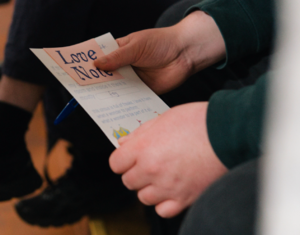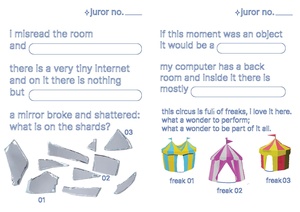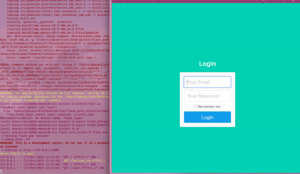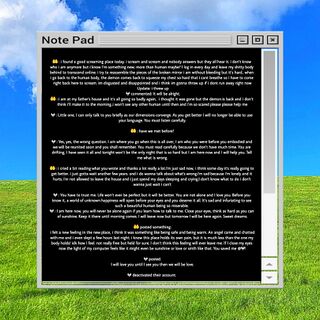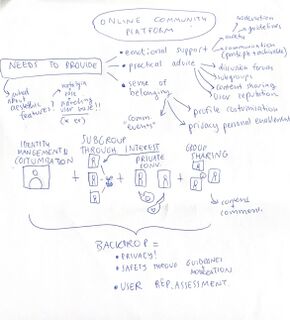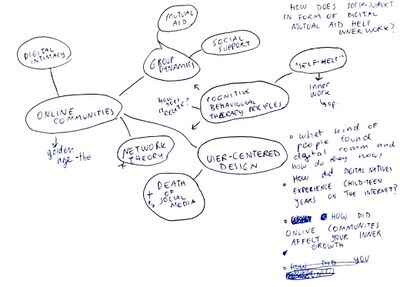𓆝 ⋆。𖦹°‧🫧
22 jan '24 - recipes/protocols for deciding how intimate something is
- relational
- being physically close
- sharing, dividing, extending experiences
- sharing information, self-disclosure
- comfort
- personalisation, situating to personal relation
- memory
- time & labour
- care
- intention
- consent, willing participation
- smaller size, feeling smaller
low intimacy: cold, distant, scant(very little and not enough), formal, frugal, generic, un-personal.
high intimacy: warm, close up, a lot and satisfactory, informal, extravagant, personal, reflecting memory, consensual and willing participation.
- intimacy building, andri says the goofier exercises build more intimacy! did it build a genuine giggle? how do you define a real giggle? you can be tickled and it can not feel intimate.
leeszaal event- XBUB2 vs. The Public
Two forms and a love note. I've been thinking about smaller internets, softer login forms, why do login forms look the way the do and ask the things they ask. In my version, they ask different things, they highlight silliness and softer landing pages. The first two questions were based on an online short poem (i misread the room and told everybody I loved them) and a hypnosis exercise (if this moment was an object what would it be? what would you do with it?), that was made to help people get in the mindset of visualisation. The next two where about the backrooms of the internet, the small personal spaces and how people felt about them and what kind of objects, metaphors and feelings did they feel the need to put there. It was more about input. The last two were interpretations of my topic, playing with metaphors. The backrooms of the internet where marginalised/traumatised people find community. They are shattered mirrors, circus performers.Once people filled out a form, I gave them somebody else's form and a love note and encouraged them to write this anonymous person a love note. This was me playing with a different part of my project, the idea of comments as love letters; the idea of anonymity as enabling care.
⋆ ˚。⋆୨🎃 31 oct '23 🎃୧ ⋆ ˚。⋆
questions for game
- if you were a body of water what body of water would you be?
- if you were a ___ what ___ would you be?
- if you were a bird what bird would you be?
- if you were an ice cream flavour what ice cream flavour would you be?
- if you were a time what time would you be?
- if you were a piece of furniture what piece of furniture would you be?
- if you were a place what place would you be?
- if you were a taste what taste would you be?
- if you were a piece of clothing what piece of clothing would you be?
- if you were a plant what plant would you be?
- if you were a scent what scent would you be?
- if you were a noise what noise would you be?
- if you were an email what email would you be?
- if you were a dinner what dinner would you be?
- if you were a problem what problem would you be?
- if you were a kitchen utensil what kitchen utensil would you be?
- if you were a day of the year which day of the year would you be?
- if you were a direction what direction would you be?
23 oct '23
leeszaal event:
- profiles, customisation : juror profile
- explore what happens if people anonymise themselves, what kind of identities f
17 oct '23
login page prototype:
cd flask_auth_scotch
python3 -m venv auth
source auth/bin/activate
pip install flask flask-sqlalchemy flask-login
(auth) adavarriale@145-137-2-185 flask_auth_scotch % cd project
(auth) adavarriale@145-137-2-185 project % python3 main.py
(auth) adavarriale@145-137-2-185 project % export FLASK_APP=project
(auth) adavarriale@145-137-2-185 project % export FLASK_DEBUG=1
(auth) adavarriale@145-137-2-185 project % cd ..
(auth) adavarriale@145-137-2-185 flask_auth_scotch % flask run
8 oct '23
STEP ONE: 3 new Rapid Prototypes:
2. & 3.6 oct '23
- three prototypes: write the field work differently, chew throw it slowly not to choke = a smaller frame, like annie lamott's writing advice. what limitations in size and length can help me with this? one square page, a conversation
- PROTOTYPE ONE:
- fit a conversation between the found & the lost in a square page. a way to explore genuine/academic writing, angel/human. Take no longer than 2 hours for this. Being now.
- marloes feedback:
Susan Leigh Star - On being allergic to onions.
Act of care for the reader and writer :)
Field work, interviews, very heavy material. Doesn't want to dump that on the reader without any care taken on how to process and engage with the material presented.
When you look for info on this, a lot of negative material surfaces about social media and the Internet in general. Found a lot of positive things though, emotional support and belonging. Will not write a defense of the Internet but write about how this can exist in a positive way.
4 oct '23
rapid prototype with manetta's feedback:
- taking one day to find a way to publish what i've done so far
- what is it?
a published fictional conversation between two people who meet in the wrong dimensions. I guess technically a series of images digitally, if I time & space = printed out into a tiny booklet maybe.
- why?
to find what matters to me through the stuff and process my information by doing. because the conversations I've had matter and because I think now it's impossible for this not to be personal!
- workflow&timtable
- now (16pm to when I'm hungry again = make images and convos). Start with gathering and rewriting then format possibles. yay.
2 oct '23
manetta feedback:
- Nami: web zines, personal stories told through web technologies as a way to claim space in the WWW https://project.xpub.nl/usx/
- Anna: conspiracy theories transformed into a game https://project.xpub.nl/when-you-might-go-astray/
- Kendal: collection of interviews and links presented in a self-made web platform https://project.xpub.nl/virtualgarden/
writing prototypes - combine the writing with making them public somehow
starting very small, the platform can be exciting but also daunting
what is doable within this day, which skills do I already have
-mode of address, how I speak as the narrator
26 set to 1 oct '23
concept to operationalise:
- operationalisation = turning abstract concepts into measurable observations.
- complex trauma = the exposure to multiple, often interrelated forms of traumatic experiences AND the difficulties that come up as a result of adapting to or surviving these experiences.
- self-fragmentation = an adaptive coping mechanism complex trauma survivors use to preserve family bonds and a modicum of hope and self-esteem. To create psychological distance from the trauma, people split their "bad" selves to whom the trauma has happened from their "acceptable" selves. However, this strategy has a high emotional cost, requiring ongoing use of dissociation, denial, and self-hatred, ultimately leading to the abandonment of the vulnerable selves to survive in an unsafe world (Fisher, 2017).
- alienation = from the self and others is a result of CT. Alienation sees both a negative sense of otherness and feelings going from rage to depression. It’s a subtraction, a withdrawal and distance. One manages the inconvenience of the world by creating distance from within. It’s an inside-out loss. If your relations to those around you were truly over and failed, you would need no distance. One only needs defence against something or someone who is still present
- (Berlant, 2022, p.26).
- marginalisation = a social process whereby individuals or groups are systematically pushed to the fringes within a society, resulting in reduced access to resources, opportunities, and participation in decision-making. It can occur due to various factors, including economic status, race, ethnicity, gender, sexual orientation, disability, religion, or cultural differences, and it can be formalised through government policies or driven by societal norms and prejudices. In the context of trauma, refers to the additional layers of suffering and vulnerability experienced by individuals who have already endured traumatic events and are further disadvantaged or excluded due to their social identity or circumstances. Trauma can compound the effects of marginalisation, as marginalised individuals often have limited access to support systems, healthcare, and resources to cope with and recover from traumatic experiences.
- spirituality = an inner self of self based on experiences of the divine. It's a relationship between an individual, the collective and the universe. It’s faith, a search for meaning and purpose, a sense of connection and a transcendence of the self that results in inner peace and well-being. It requires a relationship with something greater than the self and an holistic wholeness (Delgado, 2005).
- online community = a fluid form of human organisation that often attract people who are marginalised in their physical realities. These people then use the platforms to build new kinds of communities that they could not form in their embodied spaces. They often have counter-cultural norms and are cross-cleavage, uniting people across traditional social groupings around shared traits or interests. These groups remain private and outside traditional power structures, institutions and forms of governance(The Government Lab, 2021).
25 sep '23
gathered info on club penguin:
velighted on cplegacy:
the "oldies" from 2006, they started in 2012. They come because of nostalgia and because it's nice. people are nice, it's nice to talk to people their age or older. they have parties on the old look of cp, don't like the new one
witness conversation between legal assistant being stuck in elevator, someone remembers what she did.
they talk about coffee, she was there before, aw man I missed her. wsait you know her?
call with andri:
-people are still playing club penguin, it's being hosted somewhere else? we can't figure out where or by whom. she's been playing since 2020 when she feels depressed. she's also been interviewing people about why they play and their houses. says it's all adults who miss the old one. says if she was a better writer she'd write about these people spending hours on club penguin as adults.
survey questions for recruitment:
Have you ever been an active member of a virtual community?
Have you ever felt that people online understood you better than people in your physical reality?
Was being online a contributing factor in the development of your personal identity?
I'd love to hear your experience.
Communities:
Twitter communitites
12 steps online
Tumblr networks
Habbo
World of Warcraft
Minecraft
Roblox
Forums
Blogger
Facebook Groups
MySpace Groups
Online churches
21 sep '23
specific communities maybe? there is an autobiographical element to it. previous part, interest in fictious spaces for people to create with. talk to people who are like her and not the whole universe. makes it harder for the focus group. artistic project of negotiating with aestethics. it first starts with her and where it comes from. need to keep it open because you don't know what will come. i speak it very well when relating to bigger context. it feels very well explained and it comes from caring, which is the most human things. reading through i thought there was a bit of the why do you want to make it is has integrity, it's very nicely written. the motivation preceeds what you want to do. let's say we rearrange it: why comes first and then paragraph 2 would become 1. specificlly etc comes after. if possible, i'd make it more explicit how the outcome would be. the part in which i explain the comofort in these communities gives a start on how to work with the focus group. i wonder how it is a project about herself, what kind of energy comes from her, does her bigger experience influence or is she interested in gathering and collecting. she feels more comfortable gathering but also has something to say from herself about that. relation to previous practice more like exactly what you made. practical description of what i made before, how do you use things, what would you do with it, pictures too!
this is online community, is there going to be real-life parts too? people who meet physically? thinking of the worms, being interested in interaction and communicating with other people in real life.
it's not very clear if there is going to be a path that i'm going to take, i wonder if that's the same path of talking about healing and caring and esotericism. unpack that more. am i going to approach all of that or only one? liberate language by using esoteric practice. how do i plan to make it points? 1 = how, 2 = specific, 3 = currently speculative but more specific, specific outcomes for each of these things.
thumbs up for number 10 for having fun with it from steve.
try to combine both, distinciton of mode of address apparent and play with it. mode of address that is direct and one that is personal.
ariella, interrupt the thesis with her inner voice. she felt free to do that, it's not even a narration. akwnoledge it and have a dialogue between them. can be strenght in my thesis.
20 sep '23
concepts to be made sensitive:
𖦹 online communities + digital intimacy + network theory
𖦹 group dynamics + mutual aid + social support
𖦹 user-centred design + death of social media (rip)
𖦹 inner work as redefinition of "self-help" in relation to spiritual, social and mental well being
questions i have so far:
𖦹 how did people (other than me) experience growing up on online communities on social media?
𖦹 how did they experience these communities, what kind of dynamics affected them in that context?
𖦹 how was their own inner work of spiritual, social and mental well being affected by their belonging in these communities?
𖦹 how was their identity formation influenced by being a part of these groups?
💡🙌👽 focus-group guide
(paper to write down notes for them, candles, cozy vibes, little desserts& snacks, coffee and tea)
- start by introducing myself and thanking them for coming.
- then I tell them the purpose of the focus group: to explore experiences of belonging to online communities.
- describe what is going to happen: i will ask some questions, if you don't understand feel free to ask for clarification.
- this is not meant to be formal, please interrupt, go off-topic and especially try to talk to each other. just remember to be kind.
2. Icebreaker (5 minutes)
- to start out i'd like to ask you to please share one memorable internet-related experience. depending on the group i might share one.
** Segment 1: Early Internet Experiences (15 minutes) **
3. Online Beginnings
- try to remember your earliest internet experiences. What platforms or websites did you first engage with?
- How did you navigate the online world as children or teenagers?
- follow up on any answers.
4. Role of the Internet in Development
- Explore how the internet influenced their personal growth and development during adolescence.
- How did the internet factor in to your interests, skills, or perspectives growing up?
- Were there any specific online communities or people that played a role in their development?
**Segment 2: Social Media and Community (20 minutes)**
5. Social Media Adoption
- what about social media specifically? when and how did you start using it? try to recall what feelings it used to bring up.
- what drew you to these platforms, and how did you perceive their role in relation to connections and community?
6. Community Building
- did you have any experiences of building or participating in online communities through social media?
- what types of communities have you been a part of, and what motivated them to join?
- have you encountered any challenges or negative aspects related to online communities?
**Closing (5 minutes)**
11. Thank You and Next Steps
- thank you for your time and insight. I will use this information as part of my graduation project. your names, unless you wish for it, will not be shared but your experiences might be. please come to me before leaving if there is anything that you wouldn't like to see printed or if you'd like to be credited.

